Enhancing Nutrition and Food Safety at Cambodian Temples Through Culturally Preferred Foods
Recognizing the importance of cultural identity in nutrition, offering affordable and culturally preferred food options not only makes healthy eating more accessible—it also respects and celebrates the traditions that shape people’s daily lives. As defined by the CDC’s Food Service Guidelines Toolkit, “‘Culturally preferred foods’ describes safe and nutritious foods that meet diverse tastes and needs of customers based on their cultural identity.” When aligned with the Dietary Guidelines for Americans, these foods can help improve diet quality and overall health outcomes. At the same time, they offer a meaningful opportunity for others to explore and appreciate cuisines outside their own.
Putting Cultural Nutrition into Practice: A Cambodian Temple Case Study
Building on our previously announced collaboration, Asian Media Access (AMA) and Rochester Clinic are excited to share new updates in our ongoing efforts to support Cambodian families through culturally tailored food service guidelines. After assessing food preparation practices and community preferences at Watt Dhamma Visudhikaram, a Cambodian temple in Rochester, MN, the team has developed updated policy recommendations that strengthen food safety, promote nutritional balance, and reflect deep cultural understanding. These next steps—shaped through strong community partnerships—demonstrate how public health goals can be advanced in ways that honor tradition. This continued work sets a powerful example of how culturally informed approaches can empower families to enjoy healthy, meaningful meals rooted in heritage.
Policy Recommendations for Improving Food Safety
The updated recommendations include hygiene protocols such as proper handwashing, glove use, and the separation of utensils for raw and cooked foods; maintaining safe food temperatures; establishing regular cleaning routines; and improving waste management through designated bins. Food safety posters in Khmer are also displayed in kitchen areas to support community education.
Beyond food safety, the initiative encourages healthier meals by adapting the Harvard Healthy Eating Plate model to fit traditional Cambodian cuisine. This includes emphasizing vegetables, whole grains, and plant-based proteins, while reducing processed foods. Recognizing the high rate of lactose intolerance in the Asian community, the team also recommends replacing dairy with water or plant-based alternatives. These culturally respectful practices provide families with clear, actionable steps for preparing safe and nourishing meals.
Looking Ahead: A Season for Action
As the weather warms up and more community gatherings are on the horizon, now is the perfect time to take action. AMA and Rochester Clinic will continue working closely with temple leadership to support the next phase of improvements. Their work serves as a powerful example for others seeking to align public health nutrition with cultural traditions in meaningful and sustainable ways.
We encourage other communities, food vendors, public health agencies, and cultural initiatives to follow this lead. By conducting cultural assessments, collaborating with local partners, and incorporating culturally preferred foods into food service guidelines, we can not only improve health outcomes—but also celebrate diversity, strengthen community bonds, and promote inclusivity. Organizations are also encouraged to explore the CDC’s Food Service Guidelines Toolkit, which offers practical guidance on how to engage vendors, identify cross-cultural ingredients, and start conversations around adding culturally preferred foods to menus. These resources help answer key questions such as: How do I get support for culturally preferred foods? How can vendors include customer preferences? And how do I help vendors source authentic cultural ingredients? Together, we can build a community that uplifts health through culture-informed nutrition. For resources, updates, and more information about this initiative, visit: https://ballequity.amamedia.org/project-support and https://www.cdc.gov/food-service-guidelines-toolkit/php/strategize-act/cultural-food-preferences.html
Ange Hwang
Asian Media Access
+1 612-376-7715
email us here
Visit us on social media:
Facebook
X
Instagram
YouTube
Legal Disclaimer:
EIN Presswire provides this news content "as is" without warranty of any kind. We do not accept any responsibility or liability for the accuracy, content, images, videos, licenses, completeness, legality, or reliability of the information contained in this article. If you have any complaints or copyright issues related to this article, kindly contact the author above.
Forks at the Ready: The UK’s First Dine Out Week Is Here
Streamlined Diagnostics for Workshops: leagend Introduces MS300 OBD II Scanner for Efficient Engine Fault Management
NBC12 Segment Features Johnathan H. Miller on Summer Home Staging Strategies in Richmond
Więcej ważnych informacji
 Jedynka Newserii
Jedynka Newserii

 Jedynka Newserii
Jedynka Newserii

Handel

Polskie MŚP otrzymają większe wsparcie w ekspansji międzynarodowej. To cel nowej inicjatywy sześciu instytucji
Firmy z sektora małych i średnich przedsiębiorstw otrzymają kompleksowe wsparcie na potrzeby zwiększania konkurencyjności na arenie międzynarodowej. Taki jest cel wspólnej inicjatywy instytucji zrzeszonych w Grupie PFR pod szyldem Team Poland. Obejmuje ona zarówno wsparcie kapitałowe, w postaci gwarancji, pożyczek czy ubezpieczenia, jak i doradztwo oraz wsparcie promocyjne i informacyjne, dzięki czemu mikro-, małym i średnim firmom łatwiej będzie podjąć decyzję o ekspansji zagranicznej. Pierwszy projekt dotyczy wsparcia dla firm zainteresowanych uczestnictwem w odbudowie Ukrainy.
Bankowość
RPP zgodna co do potrzeby obniżania stóp procentowych. Trwają dyskusje dotyczące tempa tych decyzji

W lipcu Rada Polityki Pieniężnej po raz drugi w tym roku obniżyła stopy procentowe, określając swój ruch mianem dostosowania. W kolejnych miesiącach można oczekiwać kolejnych obniżek, ale ich tempo i termin będą zależeć od efektów dotychczasowych decyzji i wzrostu płac. Docelowo główna stopa procentowa ma wynosić 3,5 proc. Te okoliczności sprzyjają kredytobiorcom.
Handel
Umowa z krajami Mercosur coraz bliżej. W. Buda: Polska nie wykorzystała swojej prezydencji do jej zablokowania

– Polska podczas prezydencji w Radzie UE nie wykorzystała szansy na obronę swoich interesów w sprawie umowy z krajami Mercosur – ocenia europoseł PiS Waldemar Buda. W jego ocenie polski rząd, mimo sprzeciwu wobec zapisów umowy, nie zbudował w UE sojuszy niezbędnych do jej odrzucenia. Porozumienie o wolnym handlu spotyka się przede wszystkim z protestami europejskich rolników, którzy obawiają się zalania wspólnego rynku tańszą żywnością z krajów Ameryki Południowej. Według europosła wszystko może się rozegrać w najbliższych tygodniach.
Partner serwisu
Szkolenia

Akademia Newserii
Akademia Newserii to projekt, w ramach którego najlepsi polscy dziennikarze biznesowi, giełdowi oraz lifestylowi, a także szkoleniowcy z wieloletnim doświadczeniem dzielą się swoją wiedzą nt. pracy z mediami.






![Część środków z Planu Społeczno-Klimatycznego trafi na walkę z ubóstwem transportowym. Organizacje branżowe apelują o zmianę priorytetowych projektów [DEPESZA]](https://www.newseria.pl/files/1097841585/rower3,w_85,_small.jpg)




.gif)

 |
| |
| |
|